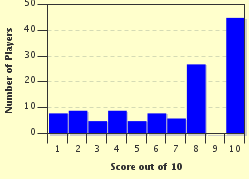
Iconic British Females Trivia Quiz
I'll give you the names of ten British women who made history in a particular area. All you need to do is match each of them to the field in which she excelled and for which she is most remembered.
A matching quiz
by rossian.
Estimated time: 4 mins.
